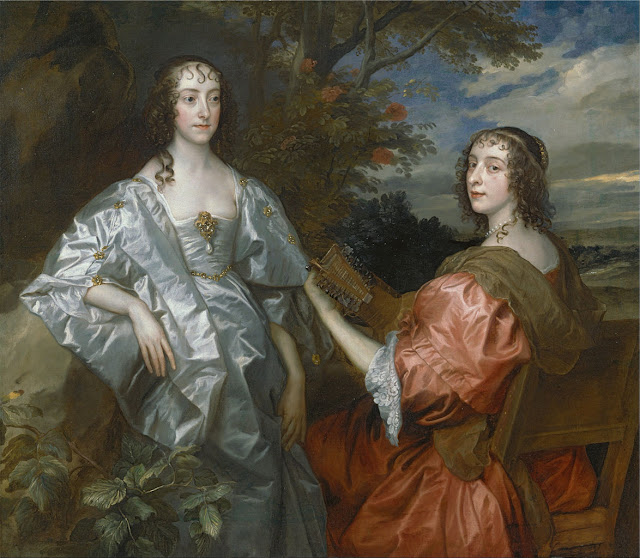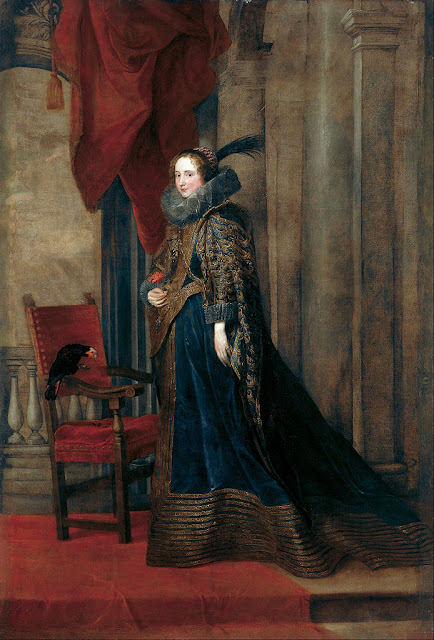 |
| Anthony van Dyck Portrait of Katherine, Countess of Chesterfield and Lucy, Countess of Huntingdon ca. 1636-40 oil on canvas Yale Center for British Art |
 |
| Anthony van Dyck Portrait of Mary Hill, Lady Killigrew 1638 oil on canvas Tate Britain |
"To be serious, and to quit the Allusion before it be worn thread-bare, I am of Opinion, that Women, that is, Women of Sense and Education (for to such alone I address myself) are much better Judges of all polite Writing than Men of the same Degree of Understanding; and that 'tis a vain Pannic, if they be so far terrify'd with the common Ridicule that is levell'd against learned Ladies, as utterly to abandon every Kind of Book and Study to our Sex. Let the Dread of the Ridicule have no more Effect, than to make them conceal their Knowledge before Fools, who are not worthy of it, nor of them. . . . In a neighboring Nation, equally famous for good Taste, and for Gallantry, the Ladies are, in a Manner, the Sovereigns of the learned World, as well as of the conversible; and no polite Writer pretends to venture upon the Public, without the Approbation of some celebrated Judges of that Sex. Their verdict is, indeed, sometimes complain'd of: and, in particular, I find, that the Admirers of Corneille, to save that great Poet's Honour upon the Ascendant that Racine began to take over him, always said, That it was not to be expected, that so old a Man could dispute the Prize, before such Judges, with so Young a Man as his Rival. But this Observation has been found unjust, since Posterity seems to have ratify'd the Verdict of that Tribunal: And Racine, tho' dead, is still the Favourite of the Fair Sex, as well as of the best Judges among the Men."
– David Hume, from Essays, Moral and Political (1742)
 |
| Anthony van Dyck Portrait of Paolina Adorno Brignole-Sale 1627 oil on canvas Musei di Strada Nuova, Genoa |
 |
| Anthony van Dyck Daedalus and Icarus ca. 1615-25 oil on canvas Art Gallery of Ontario |
 |
| Anthony van Dyck Portrait of Philip Herbert, 4th Earl of Pembroke ca. 1634 oil on canvas National Gallery of Victoria, Melbourne |
 |
| Anthony van Dyck Portrait of George Digby 2nd Earl of Bristol ca. 1638 oil on canvas Dulwich Picture Gallery, London |
 |
| Anthony van Dyck Equestrian Portrait of Anton Giulio Brignole-Sala 1627 oil on canvas Musei di Strada Nuova, Genoa |
 |
| Anthony van Dyck Vision of the Blessed Hermann Joseph 1629-30 oil on canvas Kunsthistorisches Museum, Vienna |
 |
| Anthony van Dyck Lamentation ca. 1634-40 oil on canvas Museo de Bellas Artes de Bilbao |
 |
| Anthony van Dyck Samson and Delilah ca. 1628-30 oil on canvas Kunsthistorisches Museum, Vienna |
 |
| Anthony van Dyck Portrait of a Genovese gentleman ca. 1621 oil on canvas Gemäldegalerie, Berlin |
 |
| Anthony van Dyck Portrait of a Genovese lady ca. 1621 oil on canvas Gemäldegalerie, Berlin |
 |
| Anthony van Dyck Portrait of Diego de Mexía, Marquess of Leganés before 1641 oil on canvas Fundación Banco Santander, Madrid |
 |
| Anthony van Dyck Portrait of Thomas Howard, Earl of Arundel 1620-21 oil on canvas Getty Museum, Los Angeles |
"The Earl of Arundel was the next Officer of State, who, in his own Right, and Quality, preceded the rest of the Council. He was generally thought to be a proud man, who liv'd always within himself, and to himself, conversing little with any who were in common conversation; so that he seem'd to live as it were in another Nation, his House being a place to which all people resorted who resorted to no other place; Strangers, or such who affected to look like Strangers, and dress'd themselves accordingly. He resorted sometimes to Court, because There only was a greater man than himself; and went thither the seldomer, because there Was a greater man than himself. He liv'd towards all Favourites, and great Officers, without any kind of condescension, and rather suffered himself to be ill treated by their power and authority (for he was often in Disgrace, and once or twice Prisoner in the Tower) than to descend in making any application to them. And upon these Occasions he spent a great interval of his time in several Journeys into forreign Parts, and, with his Wife and Family had liv'd some years in Italy; the humour, and manners of which Nation he seem'd most to like, and approve, and affected to imitate. He had a good fortune by Descent, and a much greater from his Wife, who was the sole Daughter upon the matter (for neither of the two Sisters left any issue) of the great House of Shrewsbury; but his Expences were without any measure, and always exceeded very much his Revenue. He was willing to be thought a Scholar, and to understand the most mysterious parts of Antiquity, because he made a wonderful and costly Purchase of excellent Statues, whilst he was in Italy, and in Rome (some whereof he could never obtain permission to remove from Rome, though he had paid for them) and had a rare Collection of the most curious Medals. As to all parts of Learning he was almost illiterate, and thought no other part of History so considerable, as what related to his own Family; in which, no doubt, there had been some very memorable Persons. It cannot be denied that he had in his person, in his aspect, and countenance, the appearance of a great man, which he preserv'd in his gate, and motion. He wore and affected a Habit very different from that of the time, such as men had only beheld in the Pictures of the most considerable Men; all which drew the eyes of most, and the reverence of many towards him, as the Image and Representative of the Primitive Nobility, and Native Gravity of the Nobles, when they had been most Venerable: but this was only his out-side; his nature and true humour being much disposed to levity, and delights, which indeed were very despicable and childish. He was rather thought not to be much concern'd for Religion, than to incline to this, or that Party of any: and had little other affection for the Nation or the Kingdom, than as he had a great share in it, in which like the great Leviathan he might sport himself; from which he withdrew, as soon as he discern'd the repose thereof was like to be disturb'd, and died in Italy, under the same doubtful character of Religion in which he liv'd."
– the text of the famously malicious biographical sketch of Thomas Howard, Earl of Arundel (1585-1646), published by Edward Hyde, Earl of Clarendon (1609-1674) in his biased and influential History of the Rebellion and Civil Wars in England (1704)